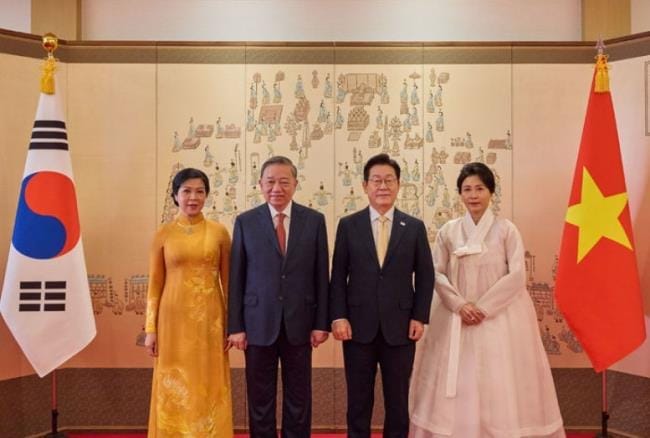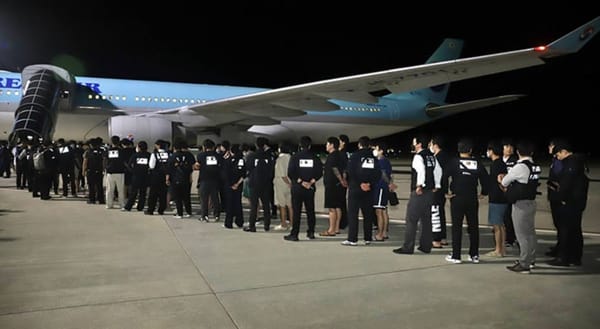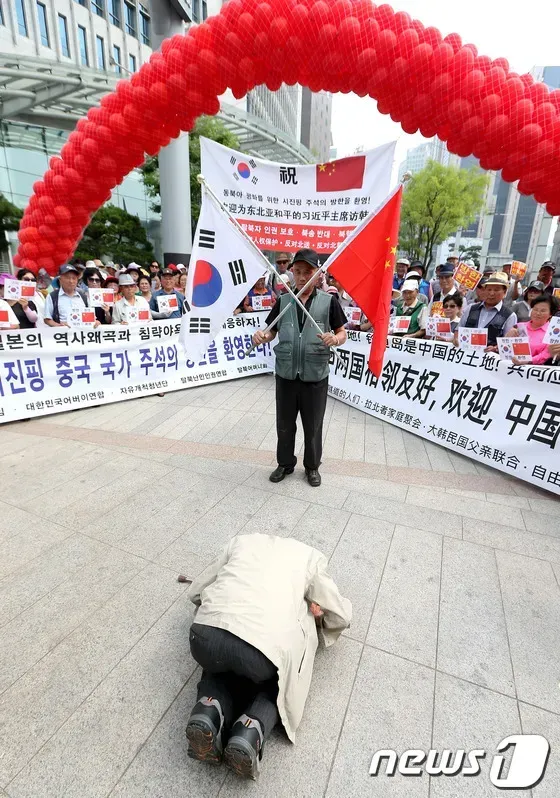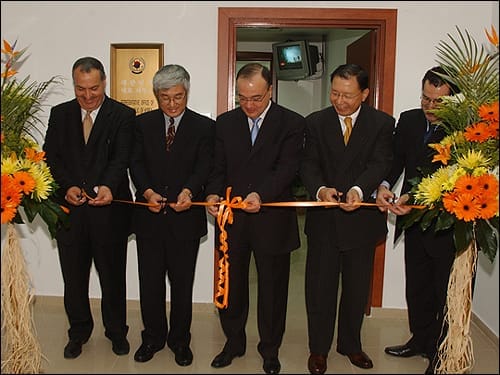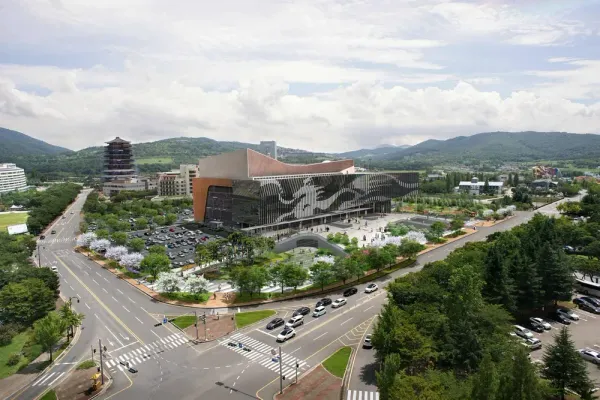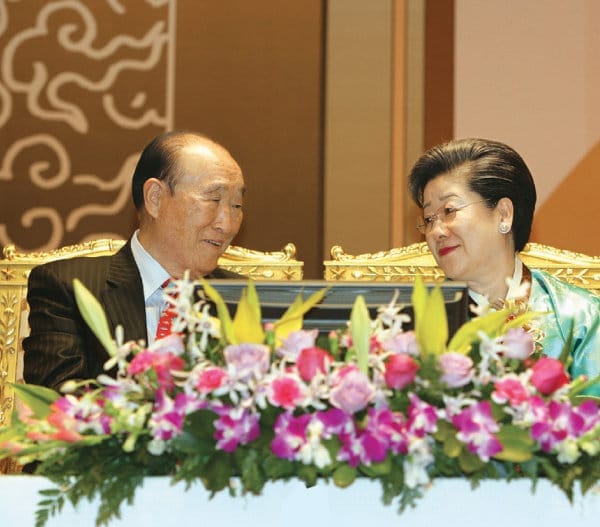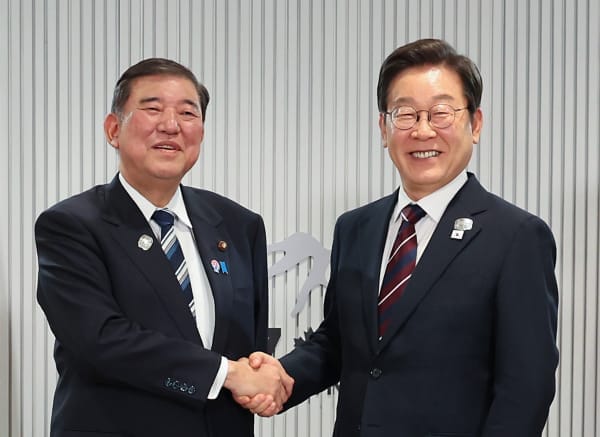Photo: President Lee Jae-myung (second from right) and First Lady Kim Hye-gyeong pose with Vietnamese General Secretary To Lam and his wife Ngo Phuong Ly. Credit: Office of the President.
For much of the 20th century, Korea - and eventually, South Korea - was a victim of history, occupied by Imperial Japan then suffering through a proxy war in the Cold War between the United States and the Soviet Union. But in Vietnam, South Korea was an aggressor, leaving an indelible stain in its modern history.
Between 1965 and 1973, South Korea sent 50k soldiers to the Vietnam War, becoming the second largest foreign contingent in Vietnam behind the US military. In addition to participating in an unjust war, Korean troops were responsible for numerous and horrific war crimes.
For the Park Chung-hee 박정희 dictatorship overseeing a country still devastated from the Korean War, South Korea’s presence in the Vietnam War solved many problems. It shored up Seoul’s status as an indispensable ally for Washington in the global standoff against communism, particularly when the Park dictatorship suffered from weak legitimacy after having come to power through military coup in 1961.
The US conferred a great deal of economic benefits in exchange, allowing South Korean construction companies into construction projects in Vietnam and giving South Korean imports a priority in the US market. Many of today’s leading South Korean corporations such as Korean Air Lines 대한항공 and Hanwha 한화 trace their initial success to the boom created by the Vietnam War.
The boom was paid for by blood. Korean soldiers were paid a pittance, even relative to soldiers from Thailand or the Philippines. (The monthly salary for a private was USD 1.) Injured soldiers - either in combat, accidents, or through exposures of Agent Orange - received little to no compensation. Already hardened by their experience in the Korean War, Korean soldiers were notorious for their brutality against the Vietnamese, committing numerous civilian massacres.
After South Korea was democratized in 1987, Seoul began attempts to make atonements, led largely by the liberal administration. The seminal moment was in 1998, when President Kim Dae-jung 김대중 visited the tomb of Ho Chi Minh and issued a statement of regret over the “unhappy past of the two countries.” Kim apologized again in 2001, and subsequent liberal presidents - Roh Moo-hyun 노무현 and Moon Jae-in 문재인 - re-affirmed South Korea’s position. South Korean courts have recognized the Korean government’s liability in the Vietnam War, and ordered reparations for Vietnamese survivors of civilian massacres. (See previous coverage, “Court Rebukes Government on Vietnam War Atrocities.”)
Meanwhile, the economic cooperation between the two countries blossomed as Vietnam underwent its own miraculous industrialization. Since normalizing diplomatic relations in 1992, trade between South Korea and Vietnam grew by over 150 times, spurred on by the 2014 bilateral free trade agreement. Since 2022, Vietnam has been South Korea’s third-largest trade partner behind the United States and China, a remarkable rise that pushed Vietnam past Japan.
Geopolitics is likely to push South Korea and Vietnam toward a deeper relationship. Vietnam benefitted from South Korea’s drive to diversify its supply chain away from China. As Donald Trump’s trade war continues to rage, South Korean corporations will continue their shift from China to Southeast Asia, using Vietnam as a launch pad. More than 10k South Korean companies are based in Vietnam; more than half of all smartphones that Samsung Electronics 삼성전자 sells around the world are manufactured in Vietnam.
The bilateral relationship is not only economic, but also personal. As two countries of the historical sinosphere, the two countries have similar culture and food. More than 4m South Koreans travel to Vietnam each year, while more than 70% of all study-abroad Vietnamese students choose to study in Korea, making up the largest share of international students in Korean universities. More than 200k Vietnamese live in South Korea as spouses of Koreans.
President Lee Jae-myung 이재명 대통령 has been pushing forward on the Korea-Vietnam relations as other liberal South Korean presidents have. Less than three weeks after Lee’s election, the presidential office met with Vietnamese survivors of civilian massacres who prevailed in the South Korean courts. The first state visit that Lee hosted was with Vietnam’s leader To Lam. Observing that South Korea and Vietnam are “like in-laws,” Lee was straightforward in South Korea’s obligation to settle its historical debt: “As to Vietnam, we should do everything within our ability. It will not be for much longer that Vietnam asks Korea for anything. We have to do what we can right now.”


